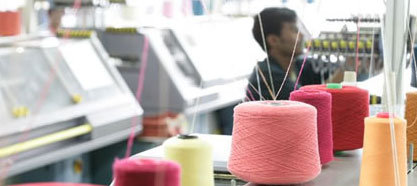By
Reuters
Reuters
Published
Mar 1, 2010
Mar 1, 2010
Mauritius textile industry needs to expand
By
Reuters
Reuters
Published
Mar 1, 2010
Mar 1, 2010
By Jean Paul Arouff
PORT LOUIS (Reuters) - Mauritius' textile firms, which supply European chains such as Next and Inditex's Zara, need additional export markets and more high-value products to remain competitive, the Indian Ocean island's industry minister said.
 |
A traditional cornerstone of the economy, the sector is facing the end of a European preferential trade deal, it was hit last year by the global downturn and company executives fear a strong local currency could hurt it further.
"To be competitive, Mauritius has to climb the ladder in terms of value-added products. Mauritius cannot remain competitive as a textile producer in manufacturing the basic textile items," Dharambeer Gokhool told Reuters in an interview on Monday 1 March.
"Competition is more intense at the low end of the market segment. It is vital for Mauritius to move up the global value-chain within the textile sector in producing value added textile items with design and brands," the minister said.
The sector is seen growing by 1 percent this year after shrinking 4 percent in 2009.
The main textile markets for Mauritius are the UK, France, Germany and Italy. Textiles contribute 6.5 percent of gross domestic product and provide 11 percent of jobs.
Gokhool said export revenues should reach 24 billion rupees in 2010, up from 23.4 billion last year.
ECONOMIC FUNDAMENTALS
Asked about calls from manufacturers for a rupee devaluation, the minister said the island's local currency should reflect economic fundamentals.
"It is obvious the rate of exchange of the rupee against major currencies is an important factor influencing exports. But this is not the one and only factor. Operators guided by their own interests would prefer a weak rupee," he said.
"But government, having the whole economy in mind, has to balance the interest of exporters with that of other sectors and the consumers. As an open economy we believe that the rupee should reflect the economic fundamentals," Gokhool said.
He said that after more than 35 years in export-oriented garment manufacturing, the Mauritian textile industry had developed the necessary resilience to face competition after a solid performance in 2009 -- despite the global slowdown.
"The crisis was severe but the textile and clothing sector has managed to resist the crisis. The value of exports in the textile and clothing sector, based on provisional figures for year 2009, increased by 0.1 percent compared to 2008."
However, Gokhool said the industry has to develop markets closer to home to capitalise on trade liberalisation in African blocs such as the Southern African Development Community (SADC) and the Common Market for Eastern and Southern Africa.
"The South African market, which constituted some 9 percent of our exports in 2009, offers the greatest opportunity after Madagascar representing some 4 percent. However, much will depend on the economic and political stability in the region", he said.
© Thomson Reuters 2024 All rights reserved.

























